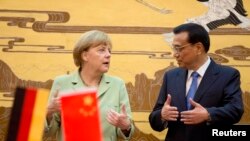German Chancellor Angela Merkel is in Beijing where she met Monday with Chinese Premier Li Keqiang.
The German leader is heading a large business delegation, and discussions with senior Chinese leaders are expected to focus on business and political ties.
Merkel arrived in Beijing Monday from Chengdu, the capital of Sichuan Province. She spent a day of her three-day visit there to tap business potential for German firms in western China.
China, which frequently praises Germany for its contrition over World War II, pointedly emphasized Japanese wartime aggression on Monday.
Premier Li Keqiang's comments come as China intensifies an anti-Japan propaganda campaign focused on wartime atrocities after Tokyo ended a ban on its military fighting abroad last week.
In remarks to mostly German and Chinese reporters, as well as Merkel, Li pointed out that Monday was the 77th anniversary of the Marco Polo Bridge incident, a skirmish in 1937 that sparked an all-out Sino-Japanese war. Li said the day was one “the Chinese people must always bear firmly in mind.”
“Facing an all-encompassing war started by Japanese militarists against China, the Chinese people rose up with all their strength to resist,” Li said. “They resisted in the blood-soaked war for eight years before finally achieving victory.
“We must always remember history to correctly face up to the past,” he added.
China has often contrasted Germany with Japan, which it says has sought to rewrite history by whitewashing military aggression.
Diplomatic sources have told Reuters Germany did not want to get dragged into the dispute between China and Japan, and dislikes China constantly bringing up Germany's painful past.
Merkel made no mention of the war in public comments.
In comments to reporters, Japanese Chief Cabinet Secretary Yoshihide Suga said Tokyo would watch China “closely” on issues of history.
“The Japanese government believes that it is not beneficial for regional peace and cooperation that China tries to turn history and other issues into international issues,” he said. “Japan's post-war steps as a peace-loving nation are highly lauded in international society.”
Ties between China and Japan, Asia's largest economies, have been shadowed by friction over Beijing's military rise and a territorial dispute in the East China Sea, as well as ugly memories about Japan's occupation of parts of China before and during World War II.
Japanese leaders have repeatedly apologized for suffering caused by the country's wartime actions, including a landmark 1995 apology by then-Prime Minister Tomiichi Murayama. Japan's government, including Prime Minister Shinzo Abe, has repeatedly said that Japan has faced up to its past sincerely.
But contradictory remarks from conservative politicians have cast doubt on that sincerity.
Chinese President Xi Jinping made a lengthy speech, aired on state television, in commemorating the Marco Polo anniversary.
“The Chinese people, who have paid a heavy sacrifice, will unswervingly defend with their blood and lives the history that has been written,” Xi said. “It is regrettable that... there is still a small portion on people who ignore reality, move against the tide of history, and repeatedly deny or even beautify a history of aggression, harming international trust, creating regional tensions and sparking censure from the Chinese people as well as all the peace-loving people of the world.”
This is Merkel's seventh visit to China as chancellor. She plans to meet with Chinese President Xi Jinping later Monday. Xi visited Germany in March where the two leaders signed various trade and economic agreements.
Reuters contributed to this report.





